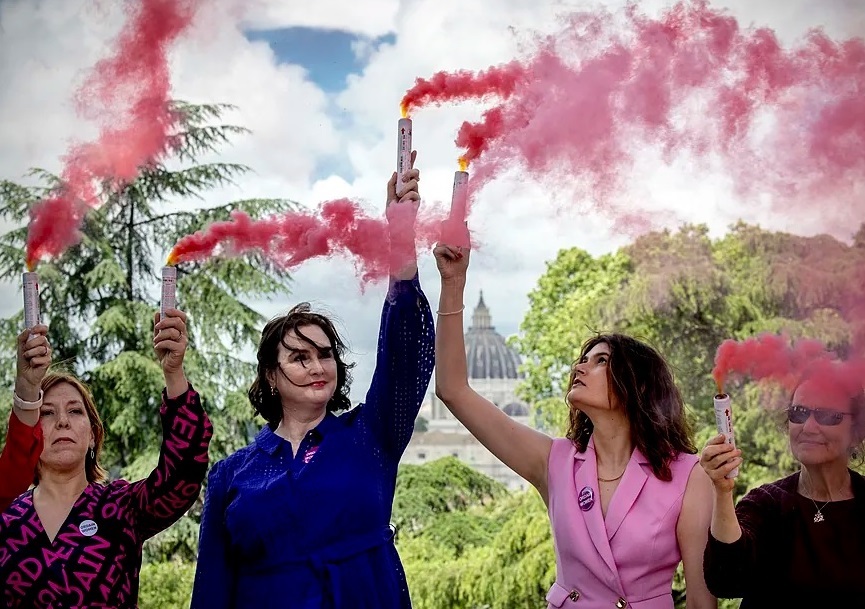Hours before the cardinals locked themselves in the conclave that will choose the successor of Francis, if they managed to see the top of Gianicolo hill in Rome, they saw pink smoke. It is the particular pink smoke with which a group of women reminds the cardinals that out of the 133 cardinals who will choose the leader of 1.4 billion faithful, none are women.
"We consider the exclusion of women from the conclave to be a sin and a scandal," says Kate McElwee, executive director of the Women's Ordination Conference based in Washington, which organizes the gathering. "While the world waits for the white or black smoke, we release the pink to send a message to the cardinals: they must consider women as equals."
This is not the first time they have climbed to the top of the hill to carry out the symbolic act. They did it in 2013, before the election of Francis, the reformist Pope. "Things have changed. He has taken the key, but has not fully opened the door. We celebrate his progress, but we are far from equality," acknowledges McElwee, whose hope is that "the next Pontiff addresses the issue urgently."
The pink smoke not only demands the opening of leadership positions for women within the Church but also their ordination as deacons or priests. They even present a list of 25 'papable' women, including American Benedictine nun, journalist, and writer Joan Chittister; Indian theologian Virginia Saldanha; and lawyer and former President of Ireland Mary McAleese.
The Argentine Pope has indeed been the most open to incorporating women into the Church. Under his Pontificate, the number of women working in the Vatican has increased from 850 to almost 1,200, according to a report by Vatican News. In the 2023 synod, women became voting members for the first time in Church history and opened up the roles of "full members" in the Vatican dicasteries, previously reserved for cardinals and bishops. Francis made another historic decision by appointing Sister Simona Brambilla, 60, as the first woman to head a Vatican dicastery: the Dicastery for the Institutes of Consecrated Life and the Societies of Apostolic Life.
Francis considered women more than capable of leading dicasteries, even stating that women are better administrators than men and that "they have been running things since the Garden of Eden." However, while actively increasing opportunities for women in the Church, he maintained his 'no' on several occasions to opening the doors to them for priesthood.
"The Pontificate of Francis is the beginning of a reform. He has set in motion internal ecclesial mechanisms to activate those aspects of the Church that previous congregations before the conclave in which he was elected Pope identified as needing reform," reflects Pedro Fernández Castelao, a professor at the Faculty of Theology of the Pontifical University of Comillas.
"Francis has had the reforming will to give space, include, or promote women in the Church: he has appointed perfect women to dicasteries, something that had never happened in the history of the Church; he has promoted canonical reforms to avoid unjust marginalizations; he has given them space in the bishops' synods and opened them up so that religious and lay women could be present," Fernández Castelao emphasizes.
The theologian points out, however, that the openness of Francis's Pontificate has reached "as far as it could." "In my opinion, Francis's limit lies in his theological structure, in his formation. He thought of the Church with doctrinal limits that he did not see the strength or clarity to change profoundly. I believe he lacked deep theological help to untie doctrinal knots that seem unbreakable," he adds.
In addition to the inclusion of women, the Argentine Pope had the will to approach those who expressed pain for the lack of attention from the Church such as homosexual individuals or divorced couples. He leaves behind the memorable phrase: "If someone is gay, seeks the Lord, and has good will, who am I to judge them?" It is reasonable to think that if the Curia chose Francis to carry out these reforms, they will not backtrack.
"It would be a historical mistake not to continue and deepen the reforms initiated by Francis. The challenge now lies with all theologians and his successor. If he wants to deepen this reform, these doctrinal points that Francis has pushed to their limits must be reinterpreted," warns Fernández Castelao, highlighting that changing the Church's doctrine at this stage is not far-fetched. "There were times when the Church in its traditional doctrine defended slavery, was against the separation of Church and State, even against human rights as in the French Revolution. Today, it does not think that way," he recalls.
